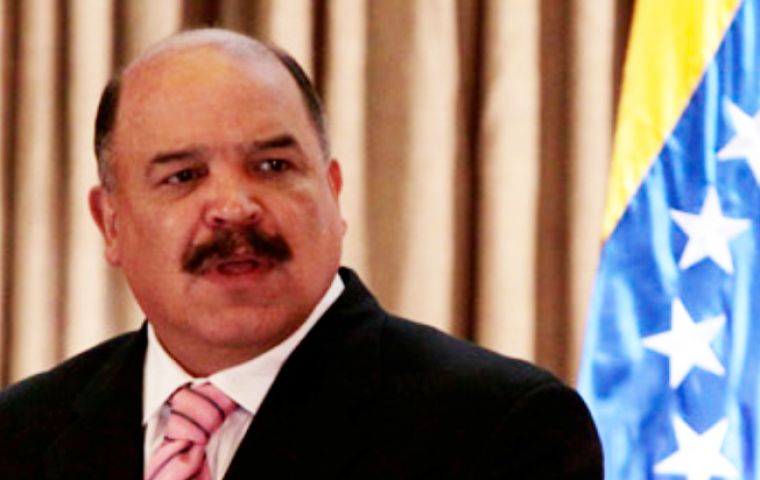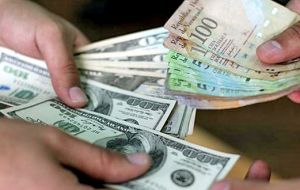MercoPress. South Atlantic News Agency
Venezuela announces yet another concealed devaluation, effective Wednesday
 Nelson Merentes said “We will incentivize import substitution and the assignment of currency under this modality will be for the productive sectors”
Nelson Merentes said “We will incentivize import substitution and the assignment of currency under this modality will be for the productive sectors”  Besides the three tier system of exchange, dollars fetch nearly 190 bolivars on the black market, according to widely referenced website dolartoday.com
Besides the three tier system of exchange, dollars fetch nearly 190 bolivars on the black market, according to widely referenced website dolartoday.com Venezuela's vice president for economic policy announced Tuesday that the government will inaugurate this week a three-tiered exchange-rate regime which includes a “totally free” market open to both individuals and companies.
The third tier, to be known as the Marginal Currency System, is to operate via banks, exchange houses and authorized traders when the new regime takes effect on Wednesday, Rodolfo Marco Torres told a press conference at the Central Bank.
Within the Marginal Currency system, authorities will allow supply and demand to determine the exchange rate, though the government reserves the right to verify “the origin of the funds” traded, the vice president said.
Venezuela's populist government instituted exchange controls in 2003 following an opposition-led general strike that inflicted considerable damage on the economy.
Officials have tinkered with the currency regime over the years to address periodic foreign-exchange shortages that have forced individual firms and even entire economic sectors to sharply curtail their operations.
The head of the Central Bank, Nelson Merentes, said that the first tier of the new currency regime, regulating the food and health sectors, will adhere to the current official exchange rate of 6.30 bolivares to the dollar.
“We will incentivize import substitution and the assignment of currency under this modality will be for those productive sectors that are committed to the country,” Torres said.
The $1=6.30 bolivares rate will apply to 70% of Venezuela's imports of necessities, the vice president said. The remaining 30% will be subject to the rate of 12 bolivares to the dollar, the price that emerged from the last current auction under the existing exchange regime, he said.
With the new regime, the government can “continue complying with its domestic and international commitments,” Torres said. “The government guarantees the fulfillment of the commitments. We will not default.”
But dollars fetch nearly 190 bolivars on the black market, according to widely referenced website dolartoday.com. Under the new system to be launched on Wednesday market sources believe the floor for the 'floating' market could be 120 bolivares to the US dollars, substantially lower than currently but still more than double the lowest existing rate.
However the change will likely lead to billions of dollars in write-downs by foreign corporations with exposure to Venezuela including General Motors Co, household goods maker Procter & Gamble Co and drugmaker Merck & Co Inc.
The tumbling price of oil, which provides nearly all of Venezuela's hard currency, has left the 12-year-old exchange controls struggling to provide dollars to ensure steady supplies of such as detergent and milk that are increasingly going missing.
Venezuela had the worst economic performance in Latin America last year with 2.8% GDP contraction and officially-estimated 64% inflation.
Investors generally interpret devaluations positively because they leave the government with more hard currency available to service debt. Venezuelan bonds, which have been trading at distressed levels on fears of a possible default, were up across the board on Tuesday, with yields on several dropping to one-month lows.
However equities investors face billions of dollars in write-downs by U.S. corporations with exposure to Venezuela, as many have been unable to repatriate bolivars back into dollars due to delays in the currency controls.
At least 40 major U.S. companies together carry at least 11 billion dollars of bolivar assets on their books, concentrated among 10 companies that have disclosed about 7.3 billion in assets linked to the country's currency system. General Motors last week said in its annual report that instability in Venezuela could lead to a 900 million hit to earnings.
Others foreign companies with notable exposure to Venezuela include Spain's Telefonica and Germany drugmaker Bayer.




Top Comments
Disclaimer & comment rules-

-

-

Read all commentsFor a supposed oil rich nation, they are doing wonderfully well..lolol
Feb 11th, 2015 - 12:11 am 0Honestly it's hard to use any word other than idiots when it comes to Venezuela.
Feb 11th, 2015 - 01:38 am 0Unbelievably sad that a country with the potential to be one of the best is destroyed from within.
Feb 11th, 2015 - 07:34 am 0Commenting for this story is now closed.
If you have a Facebook account, become a fan and comment on our Facebook Page!